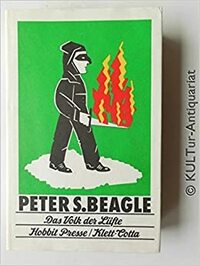Take a photo of a barcode or cover
funny
lighthearted
mysterious
medium-paced
Plot or Character Driven:
A mix
Strong character development:
Complicated
Loveable characters:
Complicated
Diverse cast of characters:
Complicated
Flaws of characters a main focus:
No
Fantastic. Literally, this story is out there, and really well written. Beagle doesn't try to explain everything to much, but just enough to give us a glimpse into the mystery of gods and goddesses.
It was a bit hard to get into, and there were definitely some lulls. The same basic story, written by any other author, would have likely lost me about 1/3 of the way in. There is just some incredible magic that Peter S. Beagle weaves in his writing that captures my mind and heart and makes me want to finish reading immediately so that I can read more, while also making me hope the book will somehow never end so that I never have to worry about running out of his words.
This book is decades old, out of print, and has been reviewed and picked apart many times over, so I'll try to keep my review short.
This is my second Peter Beagle book, and once again I'm struck by his language. This book in particular is 90% mood and atmosphere, 10% story. There is a plot, and there are characters (well drawn ones at that), but that all comes secondary to evoking a strong sense of place and mood. In fact, I'd say this book is just one big Mood. And that's kind of wonderful. Fantasy from this era has such a distinct feel - it drew me back in time to my youth, reading books much like this one and being transported.
It's also worth remarking upon how gentle this book is. There's a core of compassion that I haven't seen often in books of any genre. It hits upon bittersweetness, youth, optimism, and naivety. It paints people lovingly, even when they aren't perhaps the most lovable. It has also aged, in my opinion, very well in the treatment of women. The ladies in this book have agency and strength, and are probably the most compelling and well-rounded characters in the story.
I don't particularly have any criticisms of this book - the only reason my rating isn't higher is because I prefer a swifter story. This book is like laying in a lazy river, slowly being pulled downstream, and watching the sun wink through the tree branches overhead. It's a lovely journey. I just happen to like a few more rapids in my rivers.
This is my second Peter Beagle book, and once again I'm struck by his language. This book in particular is 90% mood and atmosphere, 10% story. There is a plot, and there are characters (well drawn ones at that), but that all comes secondary to evoking a strong sense of place and mood. In fact, I'd say this book is just one big Mood. And that's kind of wonderful. Fantasy from this era has such a distinct feel - it drew me back in time to my youth, reading books much like this one and being transported.
It's also worth remarking upon how gentle this book is. There's a core of compassion that I haven't seen often in books of any genre. It hits upon bittersweetness, youth, optimism, and naivety. It paints people lovingly, even when they aren't perhaps the most lovable. It has also aged, in my opinion, very well in the treatment of women. The ladies in this book have agency and strength, and are probably the most compelling and well-rounded characters in the story.
I don't particularly have any criticisms of this book - the only reason my rating isn't higher is because I prefer a swifter story. This book is like laying in a lazy river, slowly being pulled downstream, and watching the sun wink through the tree branches overhead. It's a lovely journey. I just happen to like a few more rapids in my rivers.
It's Peter S. Beagle, in true lyrical form, gentle, wry, humorous, melancholic with a little bit of action.
"The sky was the color of mercury, mushy as a bruise."
"As an afterthought, he also screamed "'Kreegaaahh!' at the top of his lungs, for the first time since he was eleven years old, jumping off of his parents' bed, which was the bank of the Limpopo River, onto his cousin Mary Margaret Louise, who was a crocodile."
"His mouth was badly swollen, but his style was already beginning to regenerate itself, spinning pink-and-white self-assurance before Farrell's eyes, as a lizard grows new limbs."
"She turned her back; as she did so, Farrell felt a curious desolation pass over him--a fox-fierce little autumn wind of abandonment and loss that might have blown out of his childhood, when sorrows were all the same size and came and went without ever explaining themselves."
"The sky was the color of mercury, mushy as a bruise."
"As an afterthought, he also screamed "'Kreegaaahh!' at the top of his lungs, for the first time since he was eleven years old, jumping off of his parents' bed, which was the bank of the Limpopo River, onto his cousin Mary Margaret Louise, who was a crocodile."
"His mouth was badly swollen, but his style was already beginning to regenerate itself, spinning pink-and-white self-assurance before Farrell's eyes, as a lizard grows new limbs."
"She turned her back; as she did so, Farrell felt a curious desolation pass over him--a fox-fierce little autumn wind of abandonment and loss that might have blown out of his childhood, when sorrows were all the same size and came and went without ever explaining themselves."
Just finished my first re-read of this in years, and I think I will need several future re-reads to even hope to understand this story on more than a few levels. Like anything by Beagle, The Folk of the Air seems to shift and change depending on one's own psychological state at the time of reading, some lines I realised I had memorised (despite last reading this 10 years ago) and others struck me as fresh and new, as if I had never seen them before.
This is some of Beagle's best technical writing; at times it is almost too vivid. The first chapter is so crowded with perfect, sensory metaphors that you have to pause for breath between paragraphs. The style relaxes as you continue and, in the scenes featuring the League, blossoms into Beagle at his poetic best. When he writes about music, you hear it, and feel the vibrations in the rhythm of the words. The magic scenes are hallucinogenic, but never confusing, and their power is in touching on mythic archetypes but never naming them.
As a History student (specialising in Medieval studies) I still did not get all of the references and allusions woven into this love song to the middle ages, I had to look some up (and am richer for it.) But you don't need to know what Dowland sounds like on the lute, or be familiar with Mansa Musa to enjoy the experience. This is a book for anyone who feels out of place and out of time in their own reality, not because it offers escape, but instead sympathy, and a warning. Ben and Egil's story, in particular, is achingly familiar. This is what it means to love someone who has been dead 900 years.
This book clarified for me, why I so love Medieval literature: I am in love, not with the middle ages, but with their dreams of themselves. The ghosts and shadows that were ghosts and shadows already one thousand years ago.
This is some of Beagle's best technical writing; at times it is almost too vivid. The first chapter is so crowded with perfect, sensory metaphors that you have to pause for breath between paragraphs. The style relaxes as you continue and, in the scenes featuring the League, blossoms into Beagle at his poetic best. When he writes about music, you hear it, and feel the vibrations in the rhythm of the words. The magic scenes are hallucinogenic, but never confusing, and their power is in touching on mythic archetypes but never naming them.
As a History student (specialising in Medieval studies) I still did not get all of the references and allusions woven into this love song to the middle ages, I had to look some up (and am richer for it.) But you don't need to know what Dowland sounds like on the lute, or be familiar with Mansa Musa to enjoy the experience. This is a book for anyone who feels out of place and out of time in their own reality, not because it offers escape, but instead sympathy, and a warning. Ben and Egil's story, in particular, is achingly familiar. This is what it means to love someone who has been dead 900 years.
This book clarified for me, why I so love Medieval literature: I am in love, not with the middle ages, but with their dreams of themselves. The ghosts and shadows that were ghosts and shadows already one thousand years ago.
this book has been living in a plastic box in the corner of my bedroom for 4 years and now that I am into it, hoo I am into it


